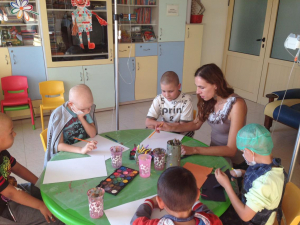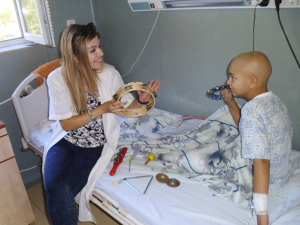
ARTON PROGRAM - The therapeutic power of the group
Creative projects involving group work - general musical performance or group painting, collage, sculpture - are useful in helping to explore and strengthen social...

A shopping addict is someone who shops compulsively and who may feel like they have no control over their behavior.
According to Ruth Engs from Indiana University, some people develop shopping addictions because they essentially get addicted to how their brain feels while shopping. As they shop, their brain releases endorphins and dopamine, and over time, these feelings become addictive. A professor in applied health sciences, Engs claims that 10 to 15 percent of the population may be predisposed to these feelings.
In some cases, it may be difficult to tell if you are, or a loved one is, a shopaholic. Many people adore shopping, and many people also spend too much money while engaging in this activity. It is important to note that going a shopping spree once in a while does not mean you are a shopping addict. However, there are several signs and symptoms shopping addicts display that you may want to look for.
Like all addicts, shopping addicts may try to hide their addiction, and if a loved one is addicted to shopping, they may try to hide it from you. If you hide credit card bills, shopping bags or receipts, you may be a shopaholic. In some cases, shopaholics may try to hide their addiction by lying about just one element of it. For instance, a person may admit they went shopping, but they may lie about how much they spent.
Some of the other emotional symptoms you may notice from a shopaholic include the following:
Although most addictions have physical symptoms related to them, shopping addictions may not. In most cases, the symptoms you experience due to your shopping addiction will be emotional in nature. The physical evidence of a shopping addiction may include a declining financial situation.
The short-term effects of a shopping addiction may feel positive. In many cases, you may feel happy after completing a shopping trip. However, these feelings are often mixed with anxiety or guilt, and in most cases, the guilt or anxiety may propel you back to the store for even more shopping.
The long-term effects of a shopping addiction can vary in intensity and scope. Many shopping addicts face financial problems, and they may become overwhelmed with debt. In some cases, they may simply max out their credit cards, but in other cases, they may take out a second mortgage on their home or charge purchases to their business credit card. If you are addicted to shopping, your personal relationships may also suffer. You may end up getting a divorce or distancing yourself from your parents, children or other loved ones.
If you are still trying to figure out whether or not you are a shopaholic, Shopaholics Anonymous suggests that you ask yourself the following questions. If you answer “yes” to many of these questions, you may have an addiction. The questions are:
Unfortunately, according to MSN Money, the research on drugs that may treat shopping addictions has not revealed any conclusive evidence about which sort of drugs may be the most helpful in treating this issue. However, many shopaholics have been able to successfully treat their addictions by turning to anti-anxiety medications or even antidepressant medications.
Reviewing an article from the Annals of Clinical Psychiatry, ABC News reports that a drug called memantine may be able to help shopaholics. Designed to treat Alzheimer’s, this drug may be able to help shopaholics make decisions more clearly, and it may also help them to avoid compulsive behavior.
The side effects of these drugs vary depending upon which medication you decide to use. If you decide to take antidepressants, for instance, you may experience any of the following side effects:
Ideally, you should speak with your doctor about possible side effects before you start taking any medication.
Withdrawal symptoms may vary from person to person, but according to the Chicago Tribune, many shopping addicts will experience withdrawal symptoms that are similar to the withdrawal symptoms experienced by people who are addicted to drugs or alcohol. If you feel irritable, depressed or out of control after shopping, you may be experiencing withdrawal, and you may need to get help.
If you and your doctor decide to treat your addiction with medication, you should always take your medication as directed. If you take too much of any prescription medication, you may risk experiencing an overdose.
According to Donald Black from the University of Iowa, as quoted in Esperanza magazine, nearly two-thirds of all shopaholics struggle with depression or anxiety. In order to effectively treat your shopping addiction, you may also need to deal with your other mental health issues. Ideally, when searching for a recovery program, you should try to find a recovery program that can address both aspects of your addiction.
In some cases, shopping addictions can be related to a substance abuse issue. If you believe that you are, or a loved one is, struggling with substance abuse and a shopping addiction, it is time to get help. With the right professional shopping addiction treatment, you will be able to gain control over your life again.
It isn’t fun to feel out of control or depressed about shopping too much. It isn’t pleasant to lose those close to you due to the arguments that may occur as a result of your shopping addiction. If you are, or a loved one is, struggling with a shopping addiction, it is time to get help now.
To get help on treating shopping addiction, you simply need to pick up the phone. Our trained staff members are standing by at to help you.

Creative projects involving group work - general musical performance or group painting, collage, sculpture - are useful in helping to explore and strengthen social...

In the ARTON Program our team of oncopsychologists, art therapists and music therapists develops the process of children's creativity as a process of...

In ARTON sessions, creating a piece of music or a song is an emotional experience of coping and satisfaction for the participating children. They make friends with...

Painting provides patients with a spontaneous, plastic method of depicting thoughts and experiences. Painting with paints is not as structured as with pencil or...










